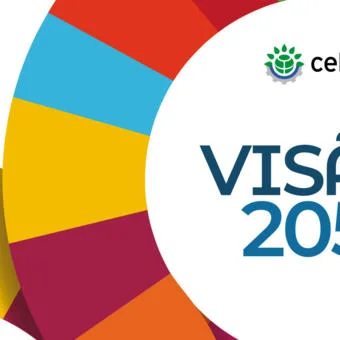Rio de Janeiro, 25 March 2021: What does a sustainable Brazil look like in 2050? How can leading companies contribute to achieving a future in which 240 million people who will live in Brazil by the middle of this century can live well, within the boundaries of the country’s resources? And what are the necessary transformations required to bring Brazil onto a more sustainable path?
These are some of the questions addressed by the Brazilian Business Council for Sustainable Development (CEBDS) as it launched Visão 2050, a refresh of its Vision 2050 originally launched in 2012 on the eve of the Rio+20 Conference.
Visão 2050 presents a systemic approach that reflects the collective understanding of the urgent transformations Brazil needs, and highlights the challenges that lie ahead to move towards an inclusive, resilient, fair, and shared economy. Visão 2050 lays out eight priority themes: People, Cities, Circular Economy, Water and Sanitation, Biodiversity, Food, Energy, and Finance. The output, focused in particular on the 2030 timeline, is the result of one year of work with contributions from companies, academia, and civil society, involving more than 4,000 stakeholders.
According to Marina Grossi, President of CEBDS, more than seeking answers, it was time to ask the right questions, especially in view of the challenging scenario of 2020: “We questioned what brought us to the multiple crises we face, aiming to point our compass towards a more sustainable and regenerative future. The pandemic anticipated situations that were already placed in the scenarios, such as the consequences of climate change and the indiscriminate use of biodiversity, and caused a turnaround in the way we see the planet, highlighting the interdependence of these issues.”
CEBDS’ launch session of Visão 2050 featured opening remarks by Peter Bakker, President and CEO of the World Business Council for Sustainable Development (WBCSD). Praising CEBDS’ work and the leadership of its member companies, he expressed the hope that “many more countries will be inspired by this work to develop their own pathways for the journey we need to arrive to our common vision of a sustainable and prosperous world in 2050.” He underscored the complementary and well-aligned nature of the Brazilian Vision with WBCSD’s Vision 2050: Time to Transform report that was launched that same day.
Other speakers highlighted specific elements of Visão 2050 in their respective remarks and panel sessions:
- Haakon Lorentzen, President, Norflor
- Teresa Vernaglia, President, BRK Ambiental
- Marcos Bicudo, President, VEDACIT and Chair of CEBDS
- Jean-Urbain Hubau, President, Ticket Log
- Feliciano Almeida, President, Michelin South America
- Luiz Eduardo Osorio, Executive Director, Vale
- Rodrigo Santos, President, Bayer
- Solange Ribeiro, President, Neoenergia
- Luciana Nicola, Superintendent, Banco Itaú
BCSD Brazil (CEBDS) is a non-profit civil association that promotes sustainable development through articulation with governments and civil society, in addition to disseminating the most current concepts and practices on the subject. Founded in 1997, it brings together about 60 of the largest business groups in the country, responsible for more than 1 million direct jobs. CEBDS is a partner of WBCSD’s Global Network, an alliance of more than 60 CEO-led business organizations worldwide. The Network, encompassing some 5,000 companies, is united by a shared commitment to provide business leadership for sustainable development in their respective countries and regions.
More information
- Visão 2050
- CEBDS web platform on the Brazilian refresh of Visão 2050
- Brazil: Vision 2050 dialogues to shape a common agenda for business action (28 November 2019)
- Marina Grossi, President, CEBDS

